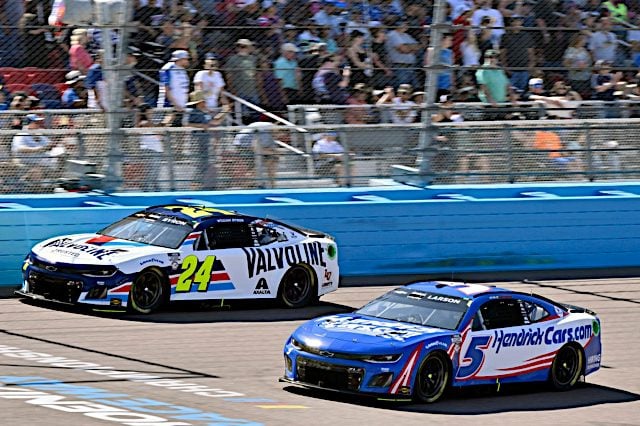Ever since the beginning of auto racing, automotive manufacturers have been heavily invested in it. The money that pours in from companies like Ford, General Motors and Toyota is a direct correlation to their sales, marketing and development efforts, as in the case of the old adage, “win on Sunday, sell on Monday.”
The thought for these companies is that the more successful their brand or brands are in auto racing against their rival manufacturers, the better their rapport will be when it comes to marketing their lineup of automobiles and services to consumers.
This is why Chevrolet has raised quite a few eyebrows in 2023. This weekend at Atlanta Motor Speedway, General Motors’ bellwether brand will try to capture its fifth win in as many races this season. Chevrolet may be starting to prove that its the manufacturer to beat this year. It might be because it cheats.
Oops, too soon?
Before we single out Chevrolet and the recent penalties accessed to its flagship organization Hendrick Motorsports and the ancillary Kaulig Racing, one has to acknowledge that bending rules has been commonplace in NASCAR since its founding.
Often, organizations and manufacturers do this to get an advantage to produce better results, and thus, better rapport on the showroom floor.
Now we should note that cheating is not a central reason why a manufacturer reigns supreme in the sport. In fact, it was not that long ago when Chevrolet was pining just to get one win. Certain manufacturers line up better with aerodynamic packages, racetrack configurations and regulations than others.
Because these aspects of stock car racing change based on NASCAR’s wants and wishes, the success of manufacturers can ebb and flow. For example, take Buick.
A new generation of racecars was introduced to the Cup Series in 1981. The more compact version of the stock car suited the Buick better than its competitors as its drivers won 22 of the 31 events contested that season. They followed up by winning 25 out of 30 in 1982. But in 1983, Buick won only six times, with Chevrolet, Ford and Pontiac making up the difference.
Yet the example of Buick has been repeated numerous times.
The mid-2000s were very Chevrolet-dominant, as the “bowties” won 64% of the races in 2006 and 72% in 2007. Hudson was victorious in 27 of the 34 events in 1952 and Plymouth trounced the competition in 1967, winning 30 of 49.
Toyota had a stranglehold of the 2016 and 2017…
Click Here to Read the Full Original Article at …

